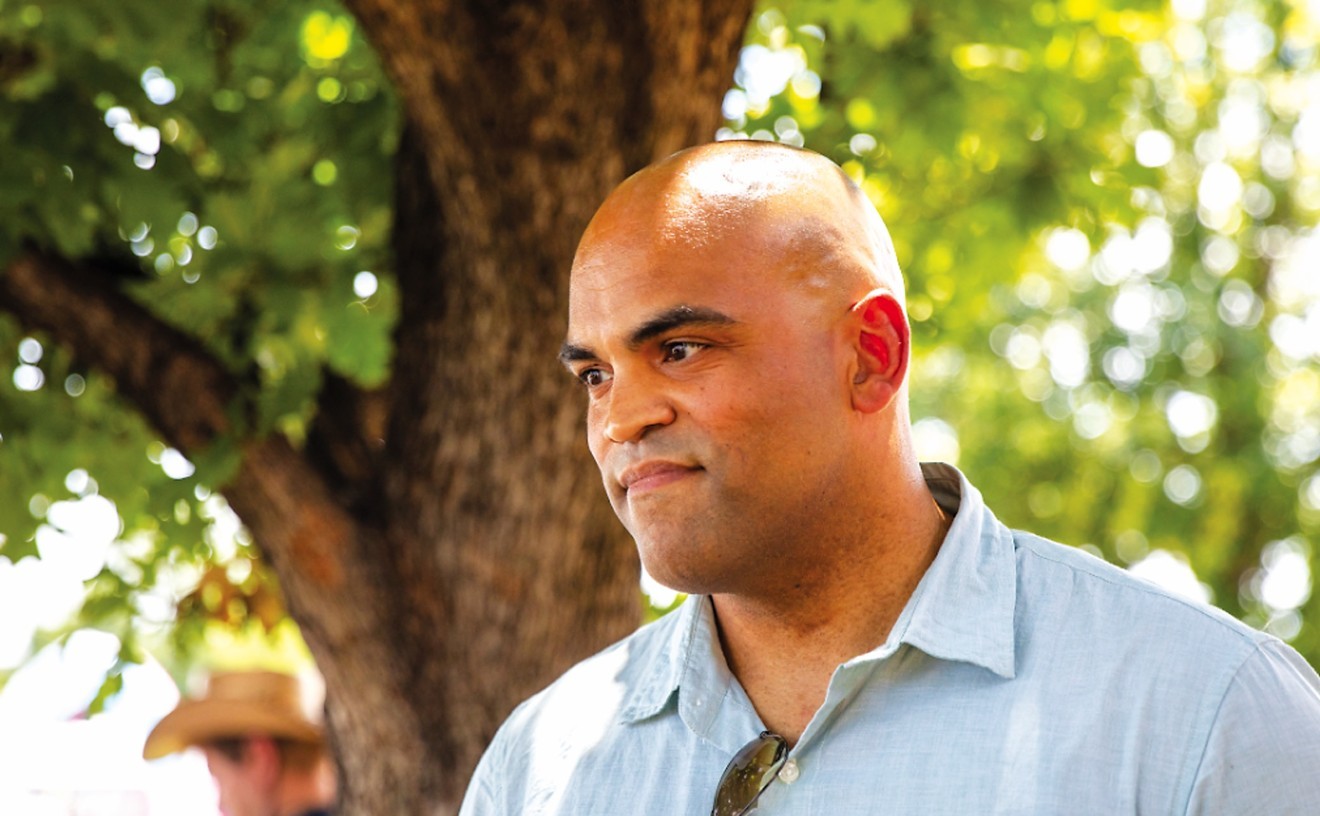This 10-page transcript of its recorded discussion, obtained by the Observer from the city auditor's office, makes clear the council, in violation of the open meetings act, instead engaged in a wide-ranging discussion of the secret $50,000 arena study.
City Councilman Paul Fielding: When was that report commissioned? Who commissioned it and how was it paid for?
First Assistant City Manager Cliff Keheley: The report was never commissioned. It had its origin in April of this year--about the time that what we called the property group began its study. I convened a group of staff personnel including property management staff, public works staff, finance department staff, legal and so forth, and based on some of the preliminary information we were learning about, coming from the Crawford group, I asked this study group I had put together to look particularly at the existing Reunion Arena site and its close environment because I was not certain as to what sort of agenda the Crawford group had, as to whether they would try to direct a study into someone else's particular piece of property, and I knew that the city had made a significant investment in infrastructure, ramp improvements, parking improvement in the vicinity of Reunion Arena. I did not feel that investment should be discounted.
In addition, I wanted to make certain that we had a full staff understanding as to what the implications were for the arena to be constructed in the Reunion site and its impact upon the Convention Center expansion, the master plan for the Reunion Arena. I put that group together in late April. I'm sorry I don't remember the exact date. The group met three times. Once in April, twice in May. By the later meeting, it was May 16 or thereabouts, it was the middle part of May, it became obvious that the Crawford group was not going to make a specific site recommendation, so I told the group to disband and to do no more work on it.
I had no knowledge that the public works department had asked JPJ Architects, who are still under contract to the city on the Convention Center expansion, to prepare some data for the particulars, some drawings representing a particular set of locations on parking lot E, which is Site #1. They had asked them to do some analysis on that and later expanded that request to cover some other sites in the downtown area in close proximity to the Convention Center. They paid for that effort by JPJ Architects out of the existing contract for the Convention Center expansion, which also provided for some master plan work. They, public works staff, felt that this was an appropriate use of funds.
We did not have any knowledge that they were doing this and were paying for it on the invoices submitted monthly by JPJ Architects. The total amount was just over $48,000. They also had some cost estimating done by Austin Commercial (ACI), who was also under contract in the Convention Center expansion. The total cost of that is just under $1,500. The total cost expended was nearly $50,000. There was a draft report generated by JPJ to issue their finding on it.
We found out--I said "we"--the city manager's office found out about that report and the work that JPJ had done about two weeks ago, one or two weeks ago, thereabouts, when they went through the matters that had been released through the blanket open records request. That's the first knowledge we had that there had been a report drafted and I set about trying to determine how it had been paid for.
Fielding: Who in public works asked for this information to be done?
Keheley: As near as I can determine, the project architect who had worked on the Convention Center and who also was one of the two architects working on the study that I appointed.
Fielding: Is this a city employee?
Keheley: Yes, sir.
Fielding: Does he or she have a name?
Keheley: Yes, sir.
Fielding: Did I need to ask what it is? Or are you going to tell me?
Keheley: Yes, you do!
City Manager John Ware: Tell them!
Keheley: Louise Elam.
Fielding: John, I really have a problem with asking questions that a city employee spent $50,000 of taxpayers' money on something and Cliff needs to look at you to see if it's OK to tell me. I have a problem with that.
Ware: You want my response?
Fielding: Please do.
Ware: I share that, that's why I (unintelligible).
Fielding: I have a problem with him feeling that there is some secret that he can't share with the council. First of all, how did this happen that a city employee goes off and spends 50 grand on something, I guess, that we don't need, didn't need? And then keep it a secret from us?
Ware: Well, I have a problem with both of those too. First of all, from a financial integrity issue based on the fundamentals. Second of all, in terms of taking a look at our vulnerability as it relates to our employees and their being able to do it in the first place. And second of all, the big concern that I have is that if I hadn't gotten the open records request, we never would have known that.
Fielding: Yeah, what Cliff was describing almost sounds that this has happened in a foreign land that you had no control over. If you'll play back what he just said, it doesn't even sound like these people work for the city manager's office--that this was some nebulous group of folks and we disassociated ourselves with [them].
Ware: That was not my intent.
Fielding: Is that a non-opinion that is just with me or do you feel like you heard what I heard--that [it] doesn't really sound like this is something that one of our employees did, this is something that they did and we don't know anything about it?
Ware: It's not a "they," Mr. Fielding. As soon as I found out about it, I directed them to get to the bottom of it and also put together a memo to be sent out to the council. So it's not an 'us vs. them'.
Fielding: Well, you don't have to address it now, but at some point in this session you're going to have to convince me that there is some reason that we need as a body to go forward with this. Because I just had a real serious problem with the still-seeming lack of communication with your council on this issue. I have a problem with the way it was just expressed to us today. I'm going to have very public discussion with the press when we go back into open session, unless you convince me otherwise while we're still in here.
Ware: In all candor, I will not try to convince you to not talk to the press as it relates to this particular issue and in terms of anybody taking it upon themselves to do this. I'm going to jog the issue of intent--the employee could have been a well-intentioned employee--whereas I'm not pointing the gun at that issue. The problem we had was the ability to spend money that was not authorized was number 1, and number 2, the fact that it was able to be done without the information percolating up through the chain of command. That stuff bothers me more than anything else. As it relates to the data, it wasn't that important. They should have come forward. First of all they never should have spent the money in the first place, and No. 1, the other thing is sending out by invoice those who intend more than $10,000. To that extent...
Fielding: ...I assume it was less than $10,000 at a shot so it would not have to be approved by the council.
Keheley: No, these were all done on regular invoices submitted through the existing approved contract. It didn't require separate contracts on them; they don't because they still had funding available in the contract.
Fielding: So, basically the staff used funds that were earmarked for one thing on something else.
Ware: Yes--the funds that were earmarked for the Convention Center funds that were left over [from] the Convention Center expansion.
Fielding: Do you have plans--that is, a trail?
Ware: Yes, I do.
Fielding: Can you tell us what it is you plan to do about that or have you not decided that, or...
Ware: Well, I'm doing two things. One, we asked Jennifer Varley--every year the police department does a vulnerability assessment--first of all. Second of all, I've asked Jennifer Varley to take a look at that and then I've asked for recommendations from the ACM [assistant city manager] over that particular department. The question you have asked me--whether or not I'm going to take any punitive action--the answer is, yes!
Fielding: When do you think you will know that?
Ware: Well, I expect to know about the recommendation from the ACM by the end of this week.
Fielding: All right, thank you!
City Councilman Robert Stimson: Sounds like we have a problem with internal controls from an accounting standpoint. Putting a best face on it, we're a classic case on some pretty poor internal controls as far as who ordered the goods and who authorized them. So it sounds like Ms. Varker or whoever is going to come back and report on those internal controls.
Ware: I have no problem with that, but again because of that particular issue, that's why I'm saying, I'm even ignoring the intent. Could be the best intention in the world, but if you're going to do the process now and we're exposed to that and we get somebody with a vicious intent, it could have done more damage.
Stimson: Sounds like [what] we should probably also do is notify the city auditor and our outside auditing firm of this breach of this kind of internal control so that when they're doing the audit of the city, they can take [it] into account, they can pay special attention.
Ware: I don't have a problem with sharing the work that Varley does with the auditors.
City Councilman Domingo Garcia: I'm curious to find out why did Ms. Elam feel that she had the...who pushed the (unintelligible). I got the impression that there were outside interests working with the staff that said 'put this proposal together.' And our staff went along with it for some reason. That's what it looks like; you sort of get that vibration.
Ware: I don't have that information. Cliff indicated that when he put this group together he wanted information and based on his request for the information as it relates [to] the assessment of the location of the facility over the Convention Center and whether or not it conflicted with the Convention Center master plan. Ms. Elam and staff in public works didn't feel that they had in-house expertise and since they had JPJ already under contract to do the Convention Center expansion, they went to them and JPJ charged [them] and we paid them for their assistance. And that's the information I have; I don't have any information to the contrary.
Garcia: Were any other groups paid besides...?
Ware: Two, JPJ and Austin Commercial.
Garcia: How much did each one make?
Ware: JPJ, $48,000. Austin Commercial, $1,500.
Garcia: Have you made contact with either of those two companies to see if they (unintelligible) with Ms. Elam and her staff?
Ware: That will come from Jennifer Varley. That's [why] we have regular vulnerability reports.
Garcia: I would like to have an audit done and an investigation done to determine how they felt they would make this decision. The last question I have is: Who cut it, who killed it? And who decided it doesn't go to council? Somebody higher up than Louise Elam said 'this plan's no good, we're going to start all over again and not worry about it.' Who decided that?
Keheley: I disbanded the study group. I didn't even know the study had been together. I was unaware that there was even a draft report. I didn't kill it, but I did tell the group that I felt like, due [to] the fact that we pretty much now had representation [on] the Crawford committee and knew what they were recommending--that they were not recommending any specific site--that we did not need to expend any further effort on that and told the committee to go about their routine business.
Garcia: I just think this hurts the integrity of the process. I think it hurts the integrity of logic, stats. And I'm concerned that outside interests will, for whatever intention or profit driven or whatever driven, are having a disproportionate amount of influence at least on the mid-level staff and then might be filtering up. And for me as a council member, it makes it really difficult to make a decision when we don't have all the facts. Now we're talking about lot "E" site and that was just thrown out and said (unintelligible) and now I get this and then the 'who' rumor starts, and I don't know how to respond.
Ware: I share your concerns, quite frankly. When Mr. Stimson came to talk to me about 10 days ago, the first time, we got into a spirited discussion even then. I feel after having that discussion, to find out that there is another document that exists, probably I would have had a different kind of discussion with him if I had known. I agree with you as it relates to not the city's integrity foremost and staff integrity secondly--that's why I've asked Jennifer Varley to go over there and take a look at our vulnerability on two bases--one relates to this particular project but two, as it relates to the capacity of any staff member to do this, regardless of intent, again, on any project.
City Councilwoman Sandra Crenshaw: I think that moving at the rate of speed and the level of intensity that this council has expressed an interest [in] and [with] all the publicity, that maybe perhaps we have some staff that were overzealous, who thought that it was in their purview to proceed, particularly when you mention the fact that the money that they paid for this was money that was left over [from] the convention study and this in fact could be used to determine whether or not this was going to conflict. I think that there was some concern when the Convention Center was built that it have a view of this city, is that correct? And maybe, perhaps, they found some kind of correlation. But I'm wondering if [it] becomes a bigger flap and this is blown out of proportion, what kind of signal will that send to our competitors, so to speak, that maybe Dallas doesn't have their act together, that we're struggling, that we can't even come up with a site selection of a place?
Fielding: That's what I'm telling you. You better convince me before I walk out of this room!
Crenshaw: That we're struggling, we can't even do something internally, that none of us know what we're doing up here and people that they send down to represent them and their interests are not being told. And I think that we'll lose in the long run if a big flap is made out of this--which I agree with Mr. Luna [about], and I'm sure that this is not the only time that this has happened--but considering the amount of publicity, the pressure, the intensity, the great speed in which we are moving, obviously someone thought they were doing the correct thing, and I would hate for it to just kill the whole project because of this misfortune.
City Councilwoman Donna Halstead: Assuming that the public is going to be made aware or has been made aware about the existence of this study, I think it was critical that we immediately respond very strongly to the fact that an employee under the due direction took it upon herself to spend $50,000 of the taxpayers' money to do something that was not authorized. That the public is going to be quite upset in any way they see or feel that the city manager is not acting decisively and very strongly in dealing with an employee (unintelligible). A city employee paid this contribution with the public's money without direction from senior management and once it was completed, not sharing this information with senior staff. It's incredible, it's unforgivable.
Ware: (Unintelligible.)
Halstead: Is there anything in this document which I have not read, and I've told you that I've only looked at it? Is there anything in this which contradicts any of the studies which had been done up to now by either the Crawford group or the studies that we have paid $450,000 [for], or that order of magnitude?
Ware: I think that particular document, it takes a look at the sites without regard to the master plan problem-fundamental issue as opposed to (unintelligible); that's a fundamental difference.
Halstead: Does it contradict anything in those studies?
Ware: It makes a case for the placement of the arena on that particular site as opposed to the [site recommended by] Ellerbe Becket. It really didn't address it because of the direction.
Halstead: Well, I didn't remember from the Ellerbe Becket information that they focused on a specific site. They gave us a range of options to allow us to make the decision.
Ware: But we agreed that the Ellerbe Becket study wouldn't pay a lot of attention to that particular site because of the existence of the Convention Center Master Plan.
Halstead: But we do not have [a] situation where JPJ and Ellerbe Becket are contradicting each other.
Ware: Look, I can't say, no, it doesn't exist because it just--I don't think so.
Halstead: John, you're not answering my question. I don't want to read a column that Laura Miller has written next week that says--you know she's been playing amateur architect in some of her columns--and I don't want to read a column that says, in fact, this study by JPJ contradicts the study that we paid $450,000 for and jeez, all it took was one city employee breaking every rule in the book and spending $50,000, unauthorized, to get the information that we needed in the first place.
Ware: I don't think there is any significant difference.
Halstead: No significant difference?
Ware: No, but you can't compare the two because they have two different missions. And that's why you cannot say this one does not conflict with this one because of the two different missions.
The purpose behind that one was, if you'll recall, when the Crawford group first got started, we weren't sure what they were doing--or where they were going, and as Cliff indicated he was drafted in[to] putting that group together, and JPJ was asked to take a look at what the impact would be on locating on the Convention Center expansion site, and what it would look like if it did. And Ellerbe Becket was to take a look at sites in general in the general business district, and then they were also told that we have a master plan for Lot 1Site 1 and that conflicts with the placement of an arena. It's hard to answer your question the way you asked it.
Halstead: I have a real problem with the ASAP study being done. As far as I'm concerned, that employee took it upon herself to attempt to circumvent the will of the council by creating documents that steered the process of (unintelligible) and I'm very concerned about what it's going to do to the public when Laura Miller or other columnists (unintelligible)...
City Councilman Donald Hicks: No. 1, you don't make $50,000 expenditures unless somebody knows about it. No. 2, has the $50,000 expenditures--did it go through the same process as all other expenditures go through? Did the people have the authority to go ahead and do the work?
Ware: I don't understand the question.
Hicks: Did the people doing the work, submitting the report, did they have the authority from your office to do it?
Ware: Yeah, they were still under contract from the Convention Center expansion.
Hicks: To do that? And somebody tied this into the Convention Center.
Ware: Correct!
Hicks: I don't think we are going to get anywhere by trying to give you any time to come up with some kind of deal to disclose this thing and act like it's insignificant. And if it's already out of the bag, I tell you what we need to do is to drop the blow, cut our losses and step up and say that it was an error in authorization--while technically, nothing was wrong, strategically it might have been an error and I would move to correct that or something like that.
City Councilman Larry Duncan: Is there anything that you told us in here about the source--about how this study came about, this is, either you have it or [are] not gonna immediately offer this [to be] made public and it relates [to] this new study?
Ware: No, nothing in here: [Dallas Morning News reporter] Sylvia Martinez already called and talked to me about it and I responded. I have not seen the article that she wrote. The only other issue relates to the final decision, who authorized what? And the other piece [of] information would be what report we'll get from Jennifer Varley.
Duncan: Which is basically crazy--it's enough to say someone on the staff did this thing and they shouldn't have done it, and we are going to do whatever we have to do, so it [doesn't] happen again--plus corrective action.
Ware: I don't have a problem with that.










